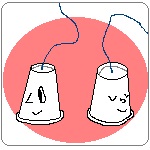風鈴さんの おぼえた日記 - 2018年4月18日(水)
この日記をフォローしているユーザ
この日おぼえたフレーズ(英語・中国語・ハングル)
おぼえた日記

遠山顕の英会話楽習 英会話リテラシー Wednesday, April 18
春
●Spring has sprung! 春が跳ねましたね!
●Spring has come. 春到来
※現在完了形、ある時そうなったことが、今もここにある
※sprung 動詞spring(跳ねる、跳びだす)の過去分詞
●Spring is here! 春が来ましたね!
●It’s spring! 春ですね!
その少し前
●Spring is in the air. Spring’s in the air.
春めいてきましたね。(空気の中に春をかんじる)
●She’s full of the joys of spring because she passed the big test last week.
※full the joys of spring とてもうれしそうで、しあわせそうで
先週大きなテストに受かったので彼女は幸せいっぱいです。
spring chicken (春に生まれた)若鶏、若者
He does 20 pull-ups. He’s 75, no spring chicken!
※be no spring chicken もう若くない、(あまり)若くない
彼は懸垂を20回します。75歳で、あまりわかくありません!
春爛漫。友人同士の会話
A: Spring has sprung!
B: Yes! I love this time of the year.
A: Me, too. I do more exercise.
B: My dad’s no spring chicken but he’s running a marathon next week.
A: Great. Nothing’s more important than your health.
B: We should join him!
A: 春がきましたね!
B: ええ!この季節だいすきです。
A: 僕もです。僕は運動量が増えます。
B: 父なんかもう若くないのに、来週マラソンにでます。
A: すごいな。健康より大切なものはないですよ。
B: 私たちもくわわりましょうよ!
ラジオ英会話 他動詞型
面白い本を読んだのよ。
I read an interesting book.
![]() /english/phrase/104617
/english/phrase/104617
基礎英語3 サクラが暗闇の中に浮き上がっている
The sakura are floating in the dark.
これはすごい!
I think this is great!
![]() /english/phrase/104707
/english/phrase/104707
中学レベルの英文法を基本から復習する その38関係代名詞の種類
格変化:who / whom / whose
●主格who
The man who ▲ is quarreling with my brother is Mr. Brown.
僕の兄と口論している男性はブラウンさんです。
●目的格whom
I know a professor of economics whom you may want to meet ▲.
君が会いたいだろうと思う経済学の教授を知っている
●所有格whose
I’m a mom whose ▲ girls are the center of my heart. (Michelle Obama)
私は娘たちが心の中心になっている母親です。
※▲ は先行詞に相当する情報が欠けている箇所を示す。
※目的格のwhom はあまり使われず
I know a professor of economics you may want to meet.
という形で表現することが多いです。
格変化:which / which / whose
●主格which
She has a cat which is small and cute.
彼女はちいさくてかわいいネコを飼っている。
●目的格
That is a theory which Mr. Chomsky has been proposing.
●所有格
He bought a car whose engine was very powerful.
彼はエンジンが強力な車を買った。
※主格と目的格は同じ形のwhich を使います。しかし、目的格はwhom の場合と同じように接触節(関係詞を使わないで先行詞を後置修飾する)で表現することが多いです。
※所有格はof which が形としてありますが、whose を使うのが一般的です。
that
that は先行詞が人、モノ、動物のいずれでも使うことができます。特に先行詞が特定可能な場合に、that は好まれる傾向があります。
The vase that she bought at the shop was very expensive.
彼女がその店で買った花瓶はとても高価だった。
The man that(who) sold it to her was a famous artist.
それを彼女に売った男性は有名な芸術家だった。
先行詞にevery、the only、all、any、a prime、形容詞の最上級、序数詞がついているときにはthat が優先的に使用されるという傾向があります。
St. Paul’s Cathedral is a prime example of Baroque architecture that was built by Sir Christopher Wren between 1675 and 1710.
セント・ポール大聖堂は1675年と1710年の間にクリストファ・レン候によって建てられたバロック建築の代表作です。
I got everything that I ordered. 注文したものは全部とどいた。
主格のwhich
●彼がある理論を提唱した
He proposed a theory.
それに「文法がどのようにはたらくかを解き明かす」を追加する
which explains how grammar works
He proposed a theory
which explains how grammar works.
ここでwhich が関係代名詞、which explains how grammar works 全体は関係詞節と呼ばれています。
●which はWhich is yours? どれがあなたのですか。「複数のなかからある対象を選び出す」ことを要請することばです。
関係代名詞のwhich も「どれってそれは」といった意味合いです。
He proposed a theory → which explains how grammar works.
彼はある理論を提唱した、→どれってそれは文法のはたらきを説明する(ものだ)
「どれって」によって先行詞と節が関連づけられ(関係)代名詞としての機能を生かして「それは」とtheory に言及するはたらきが関係代名詞which に備わっていると言えます。
Yesterday, December 7th, 1941, a date which will live in infamy, the United States of America was suddenly and deliberately attacked by naval and air forces of the Empire of Japan.
昨日、1941年12月7日、それは不名誉なものとして後世に残る日だが、アメリカ合衆国は大日本帝国航空戦力によって突然に、そして計画的に攻撃を受けました。
※同格(December 7th, 1941 = a date of which ……)のなかに制限用法としてwhichが使われています。
which の非制限用法
制限用法は先行詞の対象を特定したり限定(制限)したりする用法であり、非制限用法は後づけ的に情報を追加する方法です。
The initials “NBA,” which stand for National Basketball Association, were unfamiliar to most Japanese until several years ago.
NBA という頭文字は、全米プロバスケットボール協会という意味ですが、数年前までほとんど日本人にはなじみのないことばでした。
The driver’s license is in my wallet, which you can find on the bed.
運転免許証は僕の財布の中にあるよ、でその財布はベッドを見てごらん。
which の非制限用法では、先行する内容全体を受けて、補足的なコメントを行うことが可能となります。なお、who の非制限用法は先行詞のみを受けます。
who そして、その人は
→人を表す先行詞のみを受ける
which そして、それは(it)
→人以外の対象だけでなく、節内容の全体(it)を受ける
節を非制限的に受けるwhich の例
I had to do the dishes, which I don’t like.
皿洗いをしなくっちゃいけなかった、それは好きではないんだが。
The cat was allowed on the sofa, which irritated the dog.
ネコはソファに座るのを許された、そのことがイヌをイライラさせた。
節を先行詞とするwhich は、会話では、相手のいった内容に応答する導入語としてよく使われます。
A: And he’s somewhere that looks very much like Hawaii.
で、彼はどうやらハワイらしいところにいるようだね。
B: Which means he is on vacation? ということは、彼、休暇中ってこと?
※ここでBはAの発話全体を受けてwhich を使っています。
Residence is not a prison.
Take back the freedom to decorate.
住居は監獄ではない。
装飾する自由を取り戻しなさい。
















撮った写真を見てから分かるんですよね。
楽しい1枚ですね。